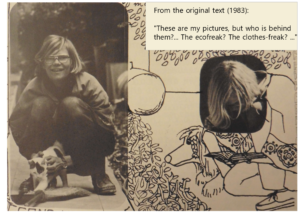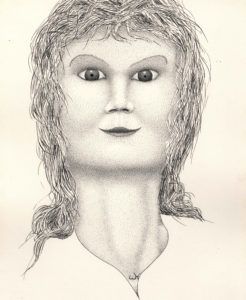In some streets in Mannheim, one side is occupied by parked cars and only one lane remains for moving traffic. This creates uncomfortable and sometimes dangerous situations for cyclists. I often cycle there with an uneasy feeling.
First example: Spinozastraße in the Oststadt
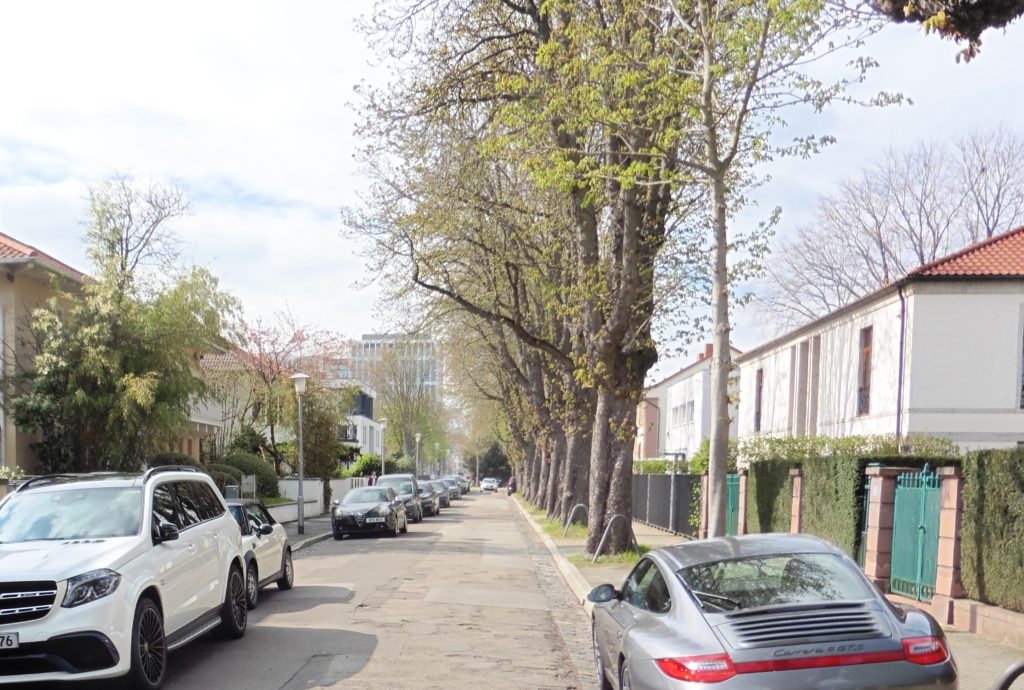
Traffic goes in both directions. However, one lane is totally occupied by parked cars – probably mostly belonging to local residents who have a garage, but who place their second or third cars on the street, or fill their garages with other things. The oncoming car visible in the distance (coming from northwest) has to switch onto the left side of the road. This means that people coming from the southeast are on the right side and have the right of way. Car drivers respect this as long as that person is in a motor vehicle, and utilize such gaps as are visible on the left side of the picture in order to yield.
Unfortunately, there are quite a few unreasonable car drivers in Mannheim, who do not respect the right of way of cyclists. They seem to think that cyclists only require 50 cm of space in order to squeeze between the sidewalk and an oncoming car. A few times I forced such a person to stop before I passed by him. Those were men every time, since testosterone seems to promote unreasonable car driving! Invariably this led to a very tense confrontation. Those people seemed to have no comprehension that a person on a bike needs some safety space from an oncoming car, nor did they seem to know that the law prescribes leaving 1.5 m of space between car and bicycle. I have the impression that such car drivers regard themselves as kings and cyclists as plebeians who should bow in submission before them. They are outraged if a cyclist demands of them to make way by going on the right side of the road.
I do not like such confrontations. Ever since the bike path on the Augustaanlage (which runs roughly parallel to this street) was opened, I practically never use the Spinozastraße in an East-West direction. I also rarely use it in West-East direction, though in that case I yield before oncoming cars because they have the right of way – and in this direction I have never experienced any conflict.
Second example: Karl-Ludwig-Straße in the Schwetzinger Vorstadt
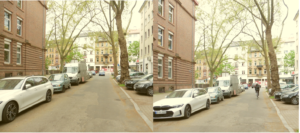
Here also one side of the street is filled with parked cars, and only one lane is available for traffic in both directions. If one turns into here by car from the Seckenheimer Straße (like the car visible in the left picture), one can not see whether anybody is approaching from 20 or 30 m ahead. There is no space on the right side to make way, because there are no gaps between the parking spaces. The only appropriate solution if somebody is approaching by bike is for the car driver to stop for a moment in order to let the cyclist pass. After all, the path of a normally driving car overlaps the path of a bicycle in the opposite direction, a far cry from 1.5 m safety distance!
Here also I encounter total incomprehension on the part of many car drivers that they should stop. They react with outrage and anger. They think I have so much space, what do I want?
I just want people to follow the law. Any car driver would allow enough space for a person on a motorbike. Why not for a cyclist – does she have less right to physical health and integrity?
It appears that cyclists who demand their rights violate the Eleventh Commandment:
Thou shalt never question the prerogatives of a car driver!
Third example: Tatersallstraße near the Wasserturm
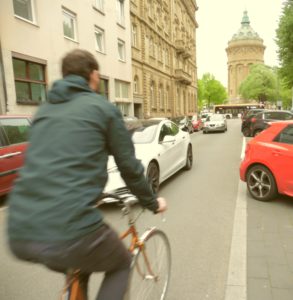
This is officially a street where cyclists have priority. Only few car drivers seem to have noticed this – maybe they consider the colorful street markings to be some pretty decoration. Does the city administration perhaps share this view?
Cars are only allowed to drive in one direction here. They primarily need the street in order to access parking lots (although there are a lot of parking spaces nearby beneath the Wasserturm, visible in the background). Cyclists are allowed to go in both directions, because this is an important connection for them between the main railway station, the central city and the Neckarstadt, parallel to the car-dominated Kaiserring. Here also: lots of car drivers are unwilling to yield to oncoming cyclists or to briefly come to a stop. In the photo one sees how the cyclist barely has 1.5 m space between the oncoming car and the parked car on the right. The picture is not posed – I only made photos for a few minutes until this situation happened to arise.
The situation is similar in the many streets in the central “Quadrate,” where parked cars leave only one narrow lane and there is one-way traffic for cars and two-way traffic for cyclists. All of these streets I use as a one-way street even as a cyclist in order to avoid unnecessary conflicts and danger. To me, the rule allowing cyclists to go in both directions on these streets is a bad joke.
How would it be possible to assure safety for cyclists in these cases?
A considerate, decent solution would be for car drivers to stop in order to allow cyclists to pass. Some do this. Many do not. It is practically not possible to demand one’s rights as a cyclist in these situations. Publicity campaigns calling car drivers to be more considerate, and calling for sensitivity about this issue in driving lessons could help, but only in the long term. The culture of the supremacy of motorists is too deeply entrenched in our society.
As a short-term personal solution, I avoid dangerous places if I have encountered too many conflicts there. However, this is only a fallback solution because it restricts my mobility as a cyclist. A city that wishes to promote bike traffic should not wish for this kind of solution.
My proposal: eliminate parking spaces at these places, because they block traffic flow. Plus I think that even while the total number of parking spaces should be reduced, more parking spaces should be created for people with disabilities and for delivery vehicles.
A city requires space for moving traffic such as public transport, bicycles, delivery services and of course for foot traffic (because without movement by foot there is no traffic at all) – and only after this for parked cars.
In Mannheim I unfortunately have the impression that too often, highest priority is granted to parked cars.





